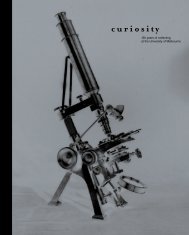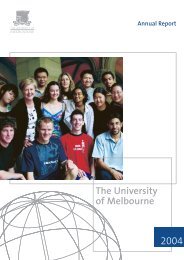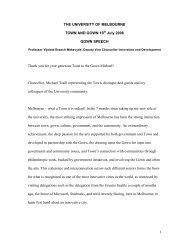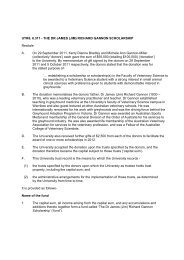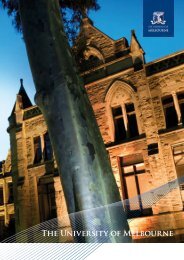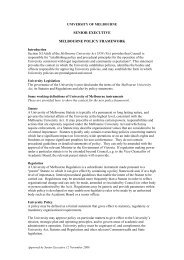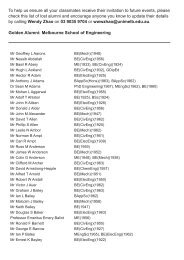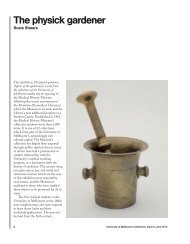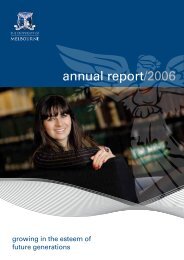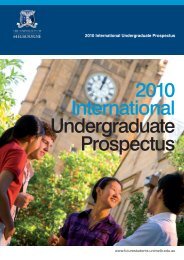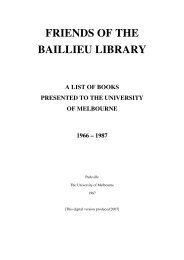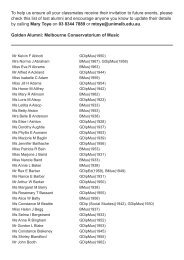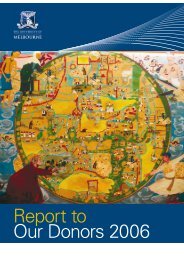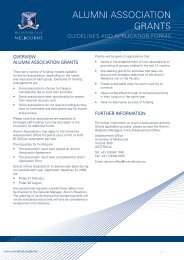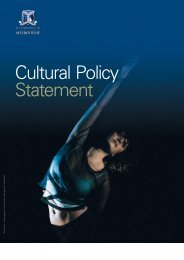2007 Annual report (PDF 8.1 Mb) - University of Melbourne
2007 Annual report (PDF 8.1 Mb) - University of Melbourne
2007 Annual report (PDF 8.1 Mb) - University of Melbourne
Create successful ePaper yourself
Turn your PDF publications into a flip-book with our unique Google optimized e-Paper software.
INTRODUCTION<br />
And OVERVIEW<br />
Introduction and Overview<br />
<strong>2007</strong>–The Year <strong>of</strong> Transition<br />
Last year this <strong>report</strong> traced <strong>Melbourne</strong>’s<br />
new strategic direction – Growing<br />
Esteem, which sets out a vision for great<br />
scholarship, research and Knowledge<br />
Transfer. In <strong>2007</strong> there were significant<br />
developments in each <strong>of</strong> these strands.<br />
In particular, <strong>2007</strong> was a watershed year<br />
as we geared up for the introduction<br />
in 2008 <strong>of</strong> the <strong>Melbourne</strong> Model, the<br />
learning and teaching component <strong>of</strong> our<br />
wider vision. The <strong>Melbourne</strong> Model is a<br />
far-reaching reform which marks a new<br />
national benchmark in higher education.<br />
It <strong>of</strong>fers undergraduate students core<br />
academic programs characterised by depth<br />
<strong>of</strong> disciplinary knowledge, complemented<br />
by breadth <strong>of</strong> knowledge and approaches<br />
across disciplines. Graduate pr<strong>of</strong>essional<br />
study or masters and PhD degrees follow<br />
the three year undergraduate degrees.<br />
LeARning and Teaching<br />
Close attention has been given this year<br />
to refining the structure and content <strong>of</strong> the<br />
new undergraduate and graduate curricula.<br />
For the six <strong>Melbourne</strong> Model undergraduate<br />
degrees – Arts, Biomedicine, Commerce,<br />
Environments, Music and Science – to be<br />
<strong>of</strong>fered for the first time in 2008, a suite<br />
<strong>of</strong> exciting new <strong>University</strong> breadth and<br />
capstone subjects has been developed.<br />
Breadth subjects are cross-disciplinary,<br />
designed to give students from all degrees<br />
exposure to different ways <strong>of</strong> knowing,<br />
while capstone subjects prepare students<br />
for life as graduates.<br />
Graduate schools <strong>of</strong>fering pr<strong>of</strong>essional<br />
qualifications are a key element <strong>of</strong> the<br />
<strong>Melbourne</strong> Model. The structure <strong>of</strong> the<br />
<strong>University</strong>’s new graduate schools was<br />
established during the year and new<br />
masters level programs developed ready<br />
for 2008. From next year students will<br />
undertake new graduate pr<strong>of</strong>essional<br />
programs in Architecture, Education, Law,<br />
Nursing, Social Work and other disciplines.<br />
Introduction <strong>of</strong> the <strong>Melbourne</strong> Model will<br />
be accompanied by a landmark package <strong>of</strong><br />
scholarships worth more than $100 million<br />
over three years. Launched in <strong>2007</strong>, the<br />
package includes an innovative new Kwong<br />
Lee Dow Young Scholars Program designed<br />
to encourage the best and brightest from<br />
every school in Victoria to consider study<br />
at the <strong>University</strong>. More than 700 Year 12<br />
scholars from 300 different schools across<br />
the State <strong>of</strong> Victoria were selected to be<br />
part <strong>of</strong> the inaugural program.<br />
During the year we presented the<br />
<strong>Melbourne</strong> Model in detail to the world<br />
to ensure all sectors <strong>of</strong> the community<br />
understand the <strong>University</strong>’s new approach.<br />
A hugely successful Open Day with a very<br />
positive response to the <strong>Melbourne</strong> Model<br />
suggests that we have been successful<br />
in doing so. Though we run the risk that<br />
demand will fall as students adjust to<br />
the end <strong>of</strong> double degrees at <strong>Melbourne</strong><br />
and the introduction <strong>of</strong> pr<strong>of</strong>essional<br />
qualifications at graduate level, the early<br />
signs are that the community is embracing<br />
the new model.<br />
ReseARCh and Research Training<br />
Like all Australian universities <strong>Melbourne</strong><br />
has been preparing for the anticipated<br />
introduction <strong>of</strong> the Research Quality<br />
Framework (RQF). Though the new<br />
Commonwealth government has now<br />
cancelled the RQF, the detailed preparation<br />
undertaken for this exercise has helped<br />
the <strong>University</strong> better understand<br />
the strengths and weaknesses <strong>of</strong> its<br />
research performance, and ensured our<br />
readiness for the Excellence in Australian<br />
Research initiative now announced as the<br />
replacement for the RQF.<br />
The complex issues facing our world<br />
require cross-disciplinary, inter-institutional<br />
and international research responses. In<br />
<strong>2007</strong> the <strong>University</strong> undertook long-term<br />
planning for major new cross-disciplinary<br />
institutes. Encouraging feasibility studies<br />
have laid the foundations for major<br />
investments in Sustainability, Immunology,<br />
Peak Computing and Materials. A Strategic<br />
Major Research Project Fund providing<br />
$30 million for major initiatives now<br />
complements the Strategic Research<br />
Initiatives Fund (SRIF). Both <strong>of</strong>fer crucial<br />
central support for areas <strong>of</strong> strategic<br />
research importance.<br />
Meanwhile, work to boost crossdisciplinary<br />
research is already bearing<br />
fruit. The <strong>University</strong> is playing a central<br />
role in the creation <strong>of</strong> clusters <strong>of</strong><br />
research expertise and partnerships<br />
for multi-disciplinary research through<br />
its visionary Bio21 Molecular Science<br />
and Biotechnology Institute and the<br />
Florey Neurosciences Institute under<br />
development on the Parkville campus. The<br />
Bio21 Institute now brings together more<br />
than 450 scientists from the <strong>University</strong>,<br />
biomedical research institutes and industry<br />
and is home to three Federation Fellows.<br />
Relationships with key affiliates like the<br />
CSIRO were strengthened during the year<br />
and six talented Future Generation Fellows<br />
were appointed, with the calibre <strong>of</strong> the<br />
candidates inspiring great confidence about<br />
the future <strong>of</strong> research at the <strong>University</strong>.<br />
Knowledge Transfer<br />
In <strong>2007</strong> the <strong>University</strong> focussed on making<br />
Knowledge Transfer part <strong>of</strong> all aspects<br />
<strong>of</strong> <strong>University</strong> life – research, curriculum,<br />
interaction with the community and<br />
processes for recognition and reward. A<br />
program <strong>of</strong> knowledge transfer awards<br />
and grants was inaugurated, with<br />
the multiple objectives <strong>of</strong> rewarding<br />
excellence, providing seeding for new<br />
knowledge transfer activities and improving<br />
understanding <strong>of</strong> knowledge transfer<br />
within the <strong>University</strong>. The applications for<br />
these awards demonstrated the breadth <strong>of</strong><br />
impressive knowledge transfer activities<br />
across the <strong>University</strong>. Knowledge transfer<br />
is now part <strong>of</strong> the promotion criteria for all<br />
staff and incorporated into the executive<br />
“The <strong>University</strong> <strong>of</strong> <strong>Melbourne</strong>’s Growing<br />
Esteem strategy affirms our intention to be<br />
one <strong>of</strong> the finest universities in the world,<br />
highly regarded for making distinctive<br />
contributions to society in research, learning<br />
and teaching and knowledge transfer.”<br />
Glyn Davis<br />
Vice-Chancellor<br />
Left: More than 60,000 prospective students and their families visited the <strong>University</strong> on Open Day.<br />
The <strong>University</strong> <strong>of</strong> <strong>Melbourne</strong> <strong>Annual</strong> Report <strong>2007</strong>



